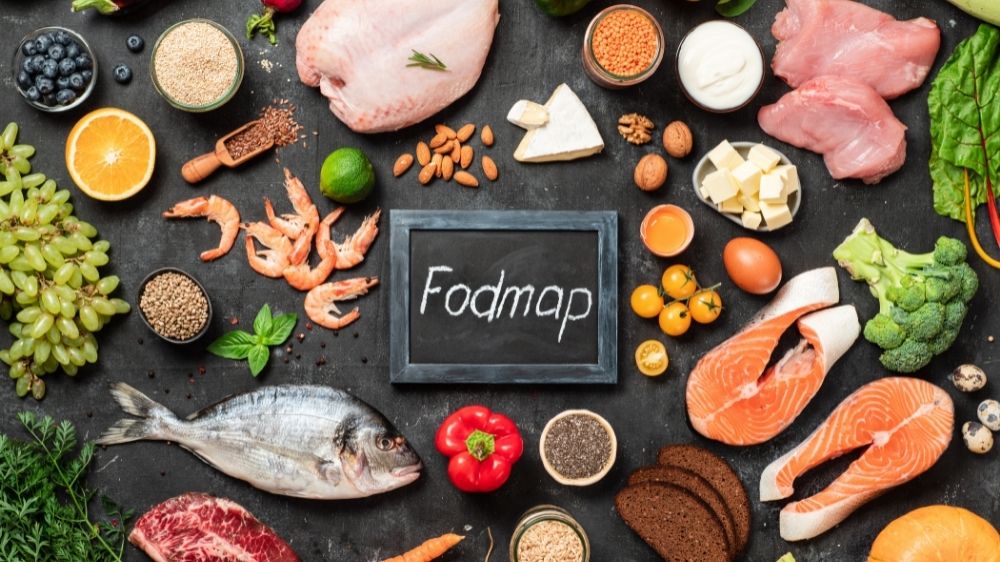We’ve all had that feeling of tightness, pressure or fullness in our tummy, sometimes to the point where we feel we may burst. This is bloating. It is quite common, with studies suggesting around 15 – 30% of the general population experiences bloating on occasion [1]. Sometimes the tummy is also visibly swollen (distended) and we have to undo a notch on our belt or change into some looser fitting attire. A bloated stomach can be a little uncomfortable and annoying, but for some it can also be very painful.
Why do we get bloated?

Most people would associate bloating with being gassy and indeed bloating may be caused by increased intestinal gas. But it can also be associated with digestion issues, hormone changes, or an underlying health condition.
When we eat or drink, gas from air or carbonated beverages can be swallowed, especially if we eat or drink too fast. This gas usually exits again through burping/belching before it passes the stomach into the intestines, but if trapped, can cause discomfort and bloating.
Further down, when any remaining undigested food we eat reaches our intestines, the carbohydrates are fermented by our gut bacteria. This act of fermentation produces various byproducts, including gases. Normal amounts of gas production can be easily handled by the body, with gas being utilised by bacteria, diffusing through tissue or exiting out the back end as flatulence (farting).
A lot of fermentation however can result in increased gas levels which can cause bloating. Some reasons for excessive fermentation can include:

- Eating too much or too fast for our upper gastrointestinal tract to digest properly, so there is more carbohydrate in the colon for the bacteria to ferment;
- Food intolerance/sensitivity – some people have issues digesting certain carbohydrates like lactose and fructose, or may be sensitive to FODMAPs (fermentable oligosaccharides disaccharides monosaccharides and polyols), which are easily and rapidly fermented by bacteria;
- Microbial dysbiosis – an imbalance in your gut microbes, either in the colon or small intestine, may mean you have less of the bacteria that absorb gasses and/or more bacteria that produce a lot of gas.
There is also evidence that some people experience bloating or abdominal discomfort even though their level of intestinal gas is “normal” or at a similar level to those who don’t experience bloating [2]. This is known as visceral hypersensitivity, where someone has a heightened perception of gas or pain, and is a common characteristic in IBS [3].
Overeating can also make people feel bloated as the stomach is very full immediately after a meal. Additionally, some foods take a long time to digest, especially proteins like red meat . This means that after a protein-rich meal, you may feel fuller/bloated for longer than if you had a fibre-rich meal, for example.
Other digestive tract issues, like constipation, gastroparesis (delayed gastric emptying) and bowel obstructions, can also cause bloating. A backed-up/blocked system results in a build-up of solids, liquids and gas which can cause expansion of the intestines, making you feel tight and bloated.
Hormones can also be to blame. It has been found that up to 85% of women experience bloating before and during their periods [4,5]. This is thought to be due to changes in hormone levels which cause the body to retain more water and salt and affect gut motility.
If bloating is persistent, then it is possible that there is an underlying medical cause, for example, gastritis (inflammation in the stomach), enteritis (inflammation in the intestines), liver disease, or cancer. Any persistent or worsening bloating and/or bloating associated with other symptoms, like fever, vomiting, unexplained weight loss, or blood in the stools, should be checked by a health practitioner.
What can I do to relieve or avoid bloating?

If you experience occasional bloating, there are a few things you can try to relieve or avoid that uncomfortable feeling.
- Investigate – first of all, try and figure out what might be causing your bloating. Does it occur when you eat certain foods? Do you eat too quickly? Are you constipated? Is it that time of the month? If you can identify something specific that is causing your bloating, then look to remove, avoid or manage that trigger.
- Take it slow – reduce the amount of air being swallowed by taking your time while eating. Also look to reduce your intake of carbonated drinks and chewing on gum.
- Manage your diet / look for low FODMAP foods – certain foods have been found to trigger bloating, particularly those that contain components that we humans don’t digest well or even at all. These include dietary fibre and the FODMAPs, such as certain sugars (e.g. fructose) and sugar alcohols (e.g. sorbitol). Typical culprits include:
- Fructan-rich vegetables: artichoke, leek, garlic, onion, chicory (inulin), asparagus
- Mannitol-rich vegetables: mushrooms, cauliflower, snow peas
- Fruit with excess fructose: apples, pears, mangoes, cherries, pears
- Grains: wholemeal bread, rye, wheat pasta
- Legumes and pulses: kidney beans, lentils, peas
- Dairy: soft cheeses, milk, yoghurt
- Sugars and sweeteners: honey, high fructose corn syrup, xylitol, sorbitol, mannitol, erythritol
Removing or limiting these foods from the diet may help to relieve bloating.
- Keep your bowels moving – sluggish bowels can contribute to bloating. Eating a good amount of dietary fibre, drinking enough water and getting regular exercise, will help to keep things moving. Be cautious of too much soluble fibre however, as this can also cause bloating. Foods high in soluble fibre include oats, beans and psyllium husk.
- Balance your microbiome – if you suspect your microbiome may be out of whack, nourish it with complex prebiotics and/or replenish it with probiotics to bring back some balance.
- Try a soothing herbal tea – some herbal teas, especially those with peppermint, may help to relieve bloating and sooth the digestive system.
Naturally FODMAP-friendly Actazin®, a green kiwifruit powder, may also help to relieve or reduce bloating. Actazin contains key bioactives that work together to support digestive health.
- There’s the proteolytic enzyme, actinidin, which improves digestion of proteins in the stomach and increases the rate of stomach emptying to help reduce the feeling of fullness and discomfort after a protein-rich meal.
- The complex kiwifruit dietary fibre in Actazin is slowly fermented by the good gut bacteria. This means any gas produced is spread out over the length of the colon and in amounts that can be readily dealt with by other bacteria, diffusion through tissue, or from being closer to the exit.
- Clinical studies have shown that Actazin helps to keep you regular and provides relief from constipation.
Don’t forget, bloating is quite common, and you are not alone if you experience it. There are several factors that can cause bloating, but simple things like slowing down when eating, consuming the right foods and keeping your bowels moving can help.
References:
[1] Sandler, R. S., Stewart, W. F., Liberman, J. N., Ricci, J. A., & Zorich, N. L. (2000). Abdominal pain, bloating, and diarrhea in the United States. Digestive diseases and sciences, 45(6), 1166-1171.
[2] Suarez, F. L., & Levitt, M. D. (2000). An understanding of excessive intestinal gas. Current gastroenterology reports, 2(5), 413-419.
[3] Agrawal, A., Houghton, L. A., Lea, R., Morris, J., Reilly, B., & Whorwell, P. J. (2008). Bloating and distention in irritable bowel syndrome: the role of visceral sensation. Gastroenterology, 134(7), 1882-1889.
[4] Tolossa, F.W., Bekele, M.L. Prevalence, impacts and medical managements of premenstrual syndrome among female students: cross-sectional study in college of health sciences, Mekelle University, Mekelle, Northern Ethiopia. BMC Women’s Health 14, 52 (2014). https://doi.org/10.1186/1472-6874-14-52
[5] Bernstein, M. T., Graff, L. A., Avery, L., Palatnick, C., Parnerowski, K., & Targownik, L. E. (2014). Gastrointestinal symptoms before and during menses in healthy women. BMC Women’s Health, 14, 14. https://doi.org/10.1186/1472-6874-14-14





